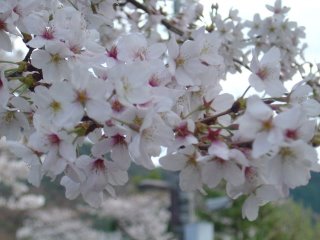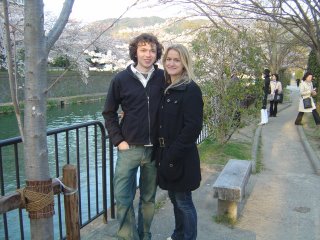09 April 2007
Pretty in Pink
 Strolling down the Philosphers Path, a quaint single lane street along a small stream flanked by the mountains that comprise Kyoto's eastern border, one can imgine contemplating the myriad existential questions that confound mankind. I say imagine because there would hardly be a worse spot to contemplate these things than when standing in line at an amusent park ride, which is what the Philopshper's Path devolves into every spring when the cherry blossoms bloom and the frenzied crowds dash to celebrate the fleeting beauty of these delicate white pink flowers.
Strolling down the Philosphers Path, a quaint single lane street along a small stream flanked by the mountains that comprise Kyoto's eastern border, one can imgine contemplating the myriad existential questions that confound mankind. I say imagine because there would hardly be a worse spot to contemplate these things than when standing in line at an amusent park ride, which is what the Philopshper's Path devolves into every spring when the cherry blossoms bloom and the frenzied crowds dash to celebrate the fleeting beauty of these delicate white pink flowers.It is the fourth time that I have witnessed this spectacle and every year I hear the same superlative commentary, while drinking the same type of beer while sitting on the same blue plastic tarp. Whether it is on the banks of the Kamo River, in Maruyama Park or on the Path of
 Philosophy, you'll get the picture. And still, people keep coming back for more year in and year out. I asked some of my friends what they thought about the whole affair. My one friend lamented that the true meaning of sakura has been obscured and is little more than a pretext to drink outdoors - not that an sort of excuse should be a pre-requisite. Another friend disagreed, she thought the trees in bloom was a sight worth celebrating.
Philosophy, you'll get the picture. And still, people keep coming back for more year in and year out. I asked some of my friends what they thought about the whole affair. My one friend lamented that the true meaning of sakura has been obscured and is little more than a pretext to drink outdoors - not that an sort of excuse should be a pre-requisite. Another friend disagreed, she thought the trees in bloom was a sight worth celebrating.I started this inquiry when I was comissioned to write about Sakura-themed tunes for the Japan Times. Of course such sentiments are nothing to Japan, only the mediums have changed. Junichiro Tanizaki’s most famous work, "The Makioka Sisters", has the Japanese title of Sasame Yuki, which refers to lightly falling snow. Most astute Japanese, however, will tell you that it really refers to the falling cherry blossoms, which in turn symbolizes the fragility of youth -and perhaps more ironically now, Japan’s fading traditional culture. These current pop songs are in some ways the descendants of the haiku,
 wood block prints and of the works of writers such as Tanizaki, all of which used sakura and hanami as an inspiration. One wonders how Tanizaki would feel about Hanami today, along with its cooption and commercialization. The thing is that while the blossoms appear only briefly, they always return the following spring. And thus the tradition of celebrating continues apace as well, only the means by with it is celebrated changes. When Mario and Zelda start having annual hanami outings, then we will know that the symbolic torch, and the more literal buck, has been passed on.
wood block prints and of the works of writers such as Tanizaki, all of which used sakura and hanami as an inspiration. One wonders how Tanizaki would feel about Hanami today, along with its cooption and commercialization. The thing is that while the blossoms appear only briefly, they always return the following spring. And thus the tradition of celebrating continues apace as well, only the means by with it is celebrated changes. When Mario and Zelda start having annual hanami outings, then we will know that the symbolic torch, and the more literal buck, has been passed on.
Comments:
<< Home
Why Kendall, you've become such a romantic, all I read from you lately is spring and blossoms 8-)
Glad to see you back on blogger, don't leave it to the mercy of non-native speaking barbarians like us.
Glad to see you back on blogger, don't leave it to the mercy of non-native speaking barbarians like us.
Why Kendall, you've become such a romantic, all I read from you lately is spring and blossoms 8-)
Glad to see you back on blogger, don't leave it to the mercy of non-native speaking barbarians like us.
Post a Comment
Glad to see you back on blogger, don't leave it to the mercy of non-native speaking barbarians like us.
<< Home
